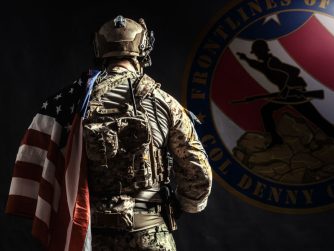We all know that Russia and China and Iran are growing their military forces and developing new weaponry. Well, for most of the past seventy years the counter to these and other aggressive nations has been the US at the head of a very powerful alliance—NATO. However, the North Atlantic Treaty Organization, which was developed after WWII as a counter to the Soviet Block, is now a hollow toy. Most NATO nations have reduced their military forces so that they could afford to expand socialist programs in their nations. Well, the socialist programs have ruined many of their economies—and the reduced military expenditures have made this once mighty force a joke. Generally, most NATO nations now have a couple of small and very effective special operations teams and a “regular” military that isn’t much more than a palace guard—good for parades and ceremonies and little else.
Remember in 2011 when our nation foolishly decided to help oust the Libyan dictator Gaddafi? We provided combat air-cover for the rebels for a few weeks—then we told NATO that it was their turn, we were pulling out. All the European countries of NATO couldn’t pull together enough fighter aircraft to provide air support for some rebels in Libya —actually, after a few days they were able to pull it off. Now, that’s weak.
If you’re wondering why it was a mistake to overthrow Gaddafi, it was because he was starting to cooperate with neighboring nations; when he was overthrown the result was total anarchy—remember Benghazi? When Libya next has a government it will likely be one run by ISIS. Nice people, ISIS.
Now Russia is threatening expansion in the Baltics, where they have large military forces. And, Europe’s hollow armed forces are incapable of conducting major rapid-response operations; this sends a great message to a Russia that is in “empire growth” mode—adding lands to their nation. Whose opinion is this—well, it’s the conclusion of the Atlantic Council—a NATO body.
The study, “Alliance at Risk: Strengthening European Defense in an Age of Turbulence and Competition,” looks at six European NATO nations’ militaries. It paints a sad picture of an alliance wholly dependent on, yes, the good old USA as their protector.
The readiness of the Britain’s army is so dismal that the deployment of a single brigade on a short notice operation poses a major challenge, wrote retired Gen. Richard Shirreff. “Indeed, last November’s deployment of a small armored battle group to Poland — to take part in a flagship NATO exercise to demonstrate solidarity against Russia — almost necessitated retrieving tanks from the training fleet in the western prairies of Canada, because the serviceability and spares situation in the UK’s fleet was so dire,” Shirreff wrote. Scary? It gets worse.
The report, composed from assessments by country experts, looked at Britain, Poland, Italy, Norway, France, and Germany.
In the case of Germany, Europe’s economic powerhouse, the military has been underfunded for a generation. The Germans are virtually incapable of conducting major operations on their own.
German defense spending, about 1.3% of the country’s GDP, “does not even begin to match the requirements,” the report says.
And while there are some commitments to increase spending, it’s expected that those funds will be eaten up by personnel costs rather than improving readiness.
Indeed, most German combat systems can’t be used immediately for missions, exercises, or training, he said.
Of Germany’s 31 Tiger helicopters, only 10 are combat-ready and deployable. Fighter jets, infantry fighting vehicles and transport aircraft are equally unprepared.
Other nations had similar critiques.
The defense of Norway, where US Marines have large stockpiles of pre-positioned weapons, rests heavily on American assistance, wrote report co-author Rolf Tamnes, director of the Oslo, Norway-based Institute for Defense Studies. “Norway cannot meet its defense obligations without a significant increase in its defense expenditures and a major reallocation of defense resources in favor of operations,” Tamnes wrote. The country is very vulnerable to Russia’s growing inventory of long-range, precision-guided weapons, he added.
One step to improve readiness is to establish a permanent NATO base in the Baltics, which would reinforce defense lines where allies are outgunned locally by a larger Russian force, the Atlantic Council study recommends.
Along with the Baltic air-policing mission, effective deterrence demands more than periodic training exercises. A permanent land presence is required to prevent any Russian attack that could achieve its aims before any NATO reserves are able to react, Shirreff wrote.
NATO is considering a plan to set up a multinational force in Eastern Europe, but that unit will be rotational rather than permanent. The size of that force is under review.
The alliance has doubled its crisis response force to 40,000 troops and created from that unit a “spearhead” force capable of operating within 48 hours of a crisis.
And, there are questions about whether NATO political decision-making is fast enough to mobilize such a force in a crisis.
Shirreff, who calls for a combined arms brigade to be established in the Baltics, says the UK needs to play a leading role in NATO’s push for more effective crisis response forces.
Bottom line, the free world needs a real leader—a position held by the US until we abandoned it. The world is a very, very dangerous place just now—we’re leaving our kids a very dangerous mess.



